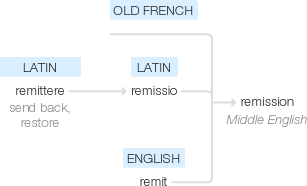Remission
Middle English: from Old French, or from Latin remissio(n- ), from remittere ‘send back, restore’ (see remit).
wiktionary
From Middle English remissioun(“release from duty; freeing of captives; mercy, pardon, respite; forgiveness; release from or reduction of penances; reduction in intensity (of a quality, symptom, etc.); transfer of property, quitclaim; legal opinion or submission; reference, cross-reference”)[and other forms], [1] from Anglo-Norman remission, remissione, remissioun, remissiun and Middle French, Old French remission(“forgiveness of sin; pardoning of an offence; postponement; cessation, suspension; diminishing or weakening of something; reduction of debt; reduction in intensity of a disease or symptom”) (modern French rémission), and their etymonLate Latin remissiō(“forgiveness; pardon of sins”), Latin remissiō(“release; sending back; easing off, relaxing, softening; reduction of debt; reduction in intensity of a disease or symptom”), from remittō(“to remit, send back; to diminish; to relax; to do without, forego”) + -siō. [2]Remittō is derived from re-(prefix meaning ‘back, backwards’) + mittō(“to cause to go; to send; to discharge, emit, let go, release; to throw; to extend, reach out; to announce, tell; to produce, yield; to attend, escort, guide; to dismiss, disregard; to end”) (possibly ultimately from Proto-Indo-European *meyth₂-(“to change, exchange; to change places, go past”) or *(s)meyt-(“to throw”)).
The English word is cognate with Catalan remissió, Italian remissioni, remissione(“remission; withdrawal of legal action; compliance, submission”), Old Occitan remessió, Portuguese remisson, remissão(“pardon; remission”), Spanish remisión(“remission”). [2]
etymonline
remission (n.)
c. 1200, remissioun, "forgiveness or pardon (of sins)," from Old French remission "forgiveness (of sins), relief" (12c.) and directly from Latin remissionem (nominative remissio) "relaxation, diminishing," etymologically "a sending back, sending away," noun of action from past-participle stem of remittere "slacken, let go, abate" (see remit).
From late 14c. as "release from duty or obligation." Of diseases, fevers, "abatement, temporary subsidence," from early 15c. General sense of "diminution of force or effects" is from c. 1600. By 1736 as "abatement of penalty or punishment."
